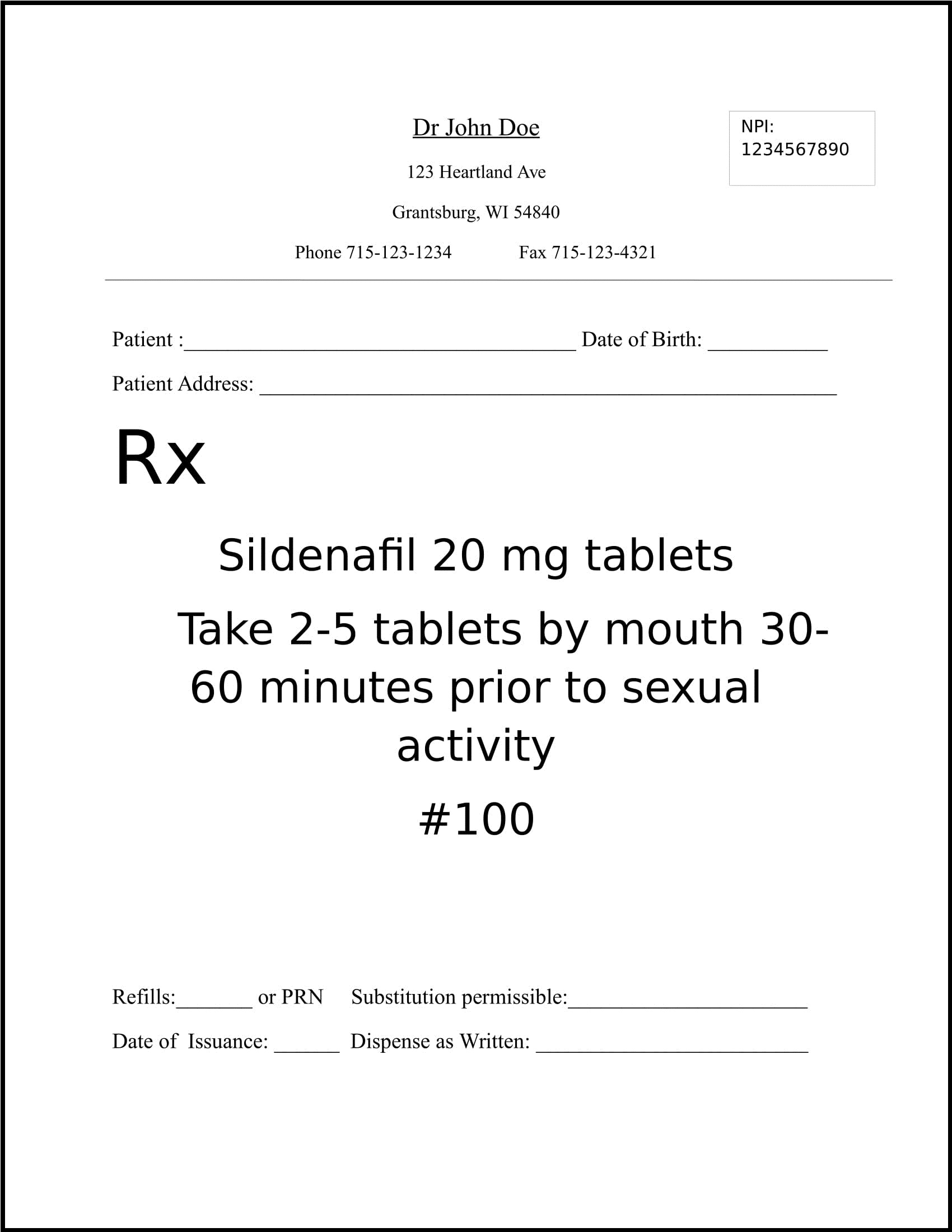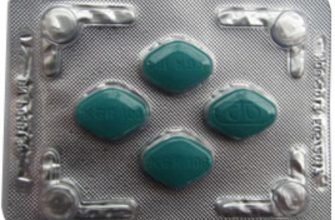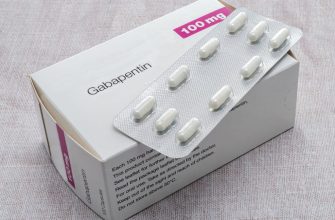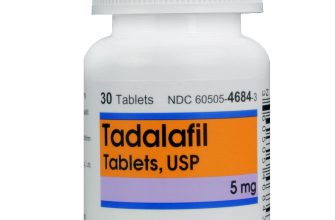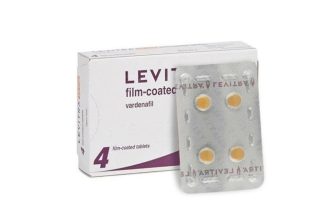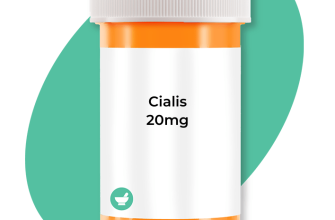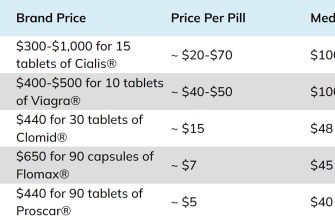To address erectile dysfunction, consider sildenafil as a reliable solution. This medication, commonly known by the brand name Viagra, helps improve blood flow to the penis, facilitating an erection when sexually stimulated. Typically prescribed for adult men, it’s crucial to follow a healthcare provider’s recommendations regarding dosage and frequency.
Sildenafil is available in various strengths, usually ranging from 25 mg to 100 mg. Starting with a lower dose can help assess tolerability, as individual responses may vary. It’s advisable to take the medication about 30 minutes to 1 hour before anticipated sexual activity, ensuring it’s effective when needed.
Be mindful of potential side effects, such as headaches, flushing, or digestive issues. Serious interactions can occur with certain medications, particularly nitrates, which are commonly prescribed for chest pain. Always inform your doctor about your current medications and health conditions to ensure a safe approach to treatment.
Regular check-ups with your healthcare provider can help track your progress and make any necessary adjustments. Establish a clear communication line with your doctor; discussing any concerns or unexpected reactions will lead to safer and more effective usage of sildenafil. By staying informed and following professional advice, you can enhance your sexual health with confidence.
- Prescription Sildenafil: A Comprehensive Guide
- What is Prescription Sildenafil and How Does It Work?
- Indications for the Use of Prescription Sildenafil
- Dosage Recommendations and Administration Guidelines
- Potential Side Effects and Risks of Sildenafil
- Serious Risks
- Interactions with Other Medications
- Interactions with Other Medications and Substances
- Guidelines for Patients: Who Should Avoid Sildenafil?
- Specific Conditions to Consider
- Medication Interactions
- Frequently Asked Questions about Prescription Sildenafil
Prescription Sildenafil: A Comprehensive Guide
Consult a healthcare provider to determine if sildenafil is appropriate for your needs. This medication primarily treats erectile dysfunction and pulmonary arterial hypertension. It works by increasing blood flow to the penis during sexual stimulation, facilitating an erection.
Dosage typically starts at 50 mg taken about one hour before sexual activity, but your doctor may adjust this based on your response and any side effects. Do not exceed the maximum recommended dose of 100 mg within a 24-hour period. Always take sildenafil as prescribed.
Be aware of potential side effects such as headaches, flushing, and indigestion. Serious side effects, including changes in vision, sudden hearing loss, or symptoms of an erection lasting more than four hours, require immediate medical attention.
Discuss with your doctor any existing health issues, especially those related to heart, liver, or kidney function. Inform them about other medications you take, as sildenafil can interact with certain drugs, particularly nitrates used for chest pain.
Avoid alcohol consumption, as it can hinder the effectiveness of sildenafil. Lifestyle changes such as quitting smoking and regular exercise may enhance overall sexual health and improve the medication’s effectiveness.
Keep this medication out of reach of children. Store it at room temperature, away from excess moisture and heat. If you miss a dose and are taking sildenafil for daily use, take it as soon as you remember, but skip it if it’s almost time for your next dose.
Regular follow-ups with your healthcare provider help monitor your response to treatment. This will allow for any necessary adjustments to your dosage or regimen.
What is Prescription Sildenafil and How Does It Work?
Prescription sildenafil is a medication primarily used to treat erectile dysfunction (ED) in men. It falls under the category of phosphodiesterase type 5 (PDE5) inhibitors, which means it helps increase blood flow to the penis during sexual arousal.
The active ingredient in sildenafil relaxes the blood vessels, allowing for improved circulation in the genital area. This process is initiated when a man is sexually stimulated, leading to an erection. The effect typically occurs within 30 minutes to an hour after taking the tablet and can last for about four hours.
To ensure optimal results, it’s advisable to take sildenafil on an empty stomach, as high-fat meals can delay its action. The usual starting dose is 50 mg, but it may be adjusted based on individual response and tolerance. Consult a healthcare provider to determine the appropriate dosage for your situation.
Side effects can include headaches, flushing, indigestion, or nasal congestion. While most side effects are mild, it’s crucial to seek medical attention if you experience severe reactions such as chest pain or a prolonged erection lasting more than four hours.
Persistent erectile dysfunction can indicate underlying health issues, so it’s wise to discuss your symptoms with a healthcare professional. Prescription sildenafil offers a reliable solution for many men experiencing ED, enhancing both confidence and intimacy in their relationships.
Indications for the Use of Prescription Sildenafil
Prescription sildenafil is primarily indicated for the treatment of erectile dysfunction (ED) in men. It acts by enhancing blood flow to the penis, facilitating the ability to achieve and maintain an erection during sexual activity.
Additionally, sildenafil is approved for the treatment of pulmonary arterial hypertension (PAH). It works by relaxing the blood vessels in the lungs, which lowers blood pressure in this area and improves exercise capacity in individuals affected by this condition.
For patients with ED, starting with a low dose and adjusting based on individual response can lead to optimal results. Always consult a healthcare provider for personalized advice and to determine the most suitable dosage. Consistent use may not be necessary; sildenafil is effective when taken approximately 30 minutes to 1 hour before sexual activity.
In the context of PAH, dosing may vary based on the severity of the condition and individual patient factors. Regular follow-ups allow for assessment of the treatment’s effectiveness and adjustments as needed.
Using sildenafil under medical supervision ensures safety, particularly for those with underlying health issues such as cardiovascular disease. A healthcare professional can provide guidance on interactions with other medications and recommend appropriate monitoring during treatment.
Dosage Recommendations and Administration Guidelines
The standard starting dose of sildenafil commonly used for erectile dysfunction is 50 mg taken about one hour before sexual activity. Adjustments can be made based on individual response and tolerability.
Here are specific dosage recommendations:
- Initial dose: 50 mg taken orally.
- The dose can be adjusted to 100 mg or decreased to 25 mg, depending on effectiveness and side effects.
- Take only once in a 24-hour period.
For patients with certain conditions, such as severe renal impairment or those over 65, starting with a lower dose of 25 mg is recommended due to heightened sensitivity to the medication.
Administration guidelines include:
- Take the tablet with or without food; however, high-fat meals may delay its effects.
- Drink with a full glass of water for optimal absorption.
- Engage in sexual stimulation for sildenafil to work effectively; it is not an aphrodisiac and will not increase libido.
Consult a healthcare professional for further personalized adjustments, especially if taking other medications or experiencing any side effects. Regular follow-ups can help monitor effectiveness and safety.
Potential Side Effects and Risks of Sildenafil
Sildenafil can lead to various side effects; awareness of these helps in managing your health effectively. Common side effects include:
- Headaches
- Flushing (redness of the face)
- Nasal congestion
- Dizziness
- Visual disturbances, such as blurred vision or color changes
Serious Risks
Some users may experience more severe reactions. Seek immediate medical attention if you encounter:
- Chest pain or irregular heartbeat
- Severe allergic reactions, including rash or itching
- Priapism (an erection lasting over 4 hours)
Interactions with Other Medications
Review your current medications with a healthcare provider. Sildenafil can interact negatively with:
- Nitrates (commonly prescribed for chest pain)
- Alpha-blockers (used for high blood pressure)
- Other erectile dysfunction treatments
Using these in combination can lead to dangerous drops in blood pressure. Being informed about side effects and interactions ensures a safer experience with sildenafil. Regular consultations with a healthcare professional play a key role in this process.
Interactions with Other Medications and Substances
Taking sildenafil alongside certain medications can lead to potentially harmful interactions. Always consult with a healthcare provider before starting or stopping any medication.
Nitrates, commonly prescribed for chest pain, can cause a severe drop in blood pressure when combined with sildenafil. This interaction can lead to dizziness, fainting, or even heart attack. Nitrates may include medications like nitroglycerin and isosorbide dinitrate. Avoid using sildenafil if you are on these drugs.
Alpha-blockers, used to treat high blood pressure and prostate conditions, also pose risks. Co-administration of sildenafil with alpha-blockers can lower blood pressure significantly, leading to increased chances of lightheadedness. If prescribed both, your doctor may adjust the doses accordingly.
Certain antiviral medications for HIV, such as ritonavir or saquinavir, may increase sildenafil levels in the blood, heightening the risk of side effects. Your provider can offer alternative treatments or monitor your response carefully.
Other medications affecting the liver enzymes, specifically CYP3A4, can influence sildenafil metabolization. Medications like ketoconazole and erythromycin may elevate sildenafil concentrations, triggering unwanted effects.
Alcohol can amplify side effects such as dizziness and lightheadedness when taken with sildenafil. Limiting alcohol intake can help manage potential adverse reactions.
Herbal supplements, such as St. John’s Wort, may reduce the effectiveness of sildenafil by influencing how the body processes the medication. Discuss all supplements with your healthcare provider to ensure safe usage.
Maintain open communication with your healthcare provider regarding your full medication list and lifestyle habits to minimize risks associated with sildenafil interactions.
Guidelines for Patients: Who Should Avoid Sildenafil?
Patients with certain medical conditions should avoid taking sildenafil. Primarily, those with severe heart or lung problems, such as uncontrolled hypertension, unstable angina, or a recent heart attack, should steer clear of this medication. The potential strain on the cardiovascular system can lead to serious complications.
Specific Conditions to Consider
Individuals diagnosed with the following conditions are advised against using sildenafil:
| Condition | Reason |
|---|---|
| Severe Heart Disease | Increases risk of heart attack or stroke during sexual activity. |
| Severe Liver Disease | Impairs drug metabolism, raising the chance of side effects. |
| Low Blood Pressure | Can cause dangerous drops in blood pressure when combined with sildenafil. |
| Retinitis Pigmentosa | Might increase the risk of vision loss, especially in those with this genetic disorder. |
| Recent Stroke | Can exacerbate complications if blood pressure fluctuates. |
Medication Interactions
Patients taking nitrate medications for heart conditions must avoid sildenafil. The combination can lead to a severe drop in blood pressure. Additionally, alpha-blockers used for prostate issues can also interact with sildenafil, requiring careful management when used together.
Always consult a healthcare provider before starting sildenafil to ensure safety and efficacy based on your health history and current medications. Your well-being is the priority.
Frequently Asked Questions about Prescription Sildenafil
Sildenafil is primarily prescribed for erectile dysfunction. This medication works by increasing blood flow to the penis, helping to achieve and maintain an erection when sexually stimulated.
What should I discuss with my healthcare provider before taking sildenafil?
Tell your doctor about any medical conditions, especially heart problems, low blood pressure, or history of stroke. Mention all medications you are currently taking, including over-the-counter drugs and herbal supplements, to avoid potential interactions.
How should I take sildenafil?
Follow your physician’s instructions carefully. Typically, take sildenafil about 30 minutes to 1 hour before sexual activity, but you can take it up to 4 hours in advance. Swallow the tablet whole with water, and do not exceed the recommended dosage.
Are there any side effects of sildenafil?
Common side effects include headaches, flushing, upset stomach, and nasal congestion. Serious side effects such as sudden vision loss or an erection lasting more than 4 hours require immediate medical attention.
Can I drink alcohol while taking sildenafil?
Limit alcohol intake as it may increase the risk of side effects like dizziness and may impair your ability to achieve an erection. It’s best to consult your healthcare provider for personalized advice.
Can sildenafil be taken with other medications?
Avoid taking sildenafil with nitrates for chest pain, as this can cause a dangerous drop in blood pressure. Always consult your healthcare provider about any other medications you are taking, including recreational drugs like “poppers.”
| Side Effect | Description |
|---|---|
| Headaches | Common and typically mild, may subside over time. |
| Flushing | Redness or warmth in the face, neck, or chest. |
| Nasal Congestion | Temporary stuffiness or runny nose. |
| Vision Changes | Changes in color perception or blurred vision, rare but serious. |
| Priapism | Prolonged erection; requires immediate medical attention. |
Where should I store sildenafil?
Store sildenafil at room temperature, away from moisture and heat. Keep it out of reach of children and pets to ensure their safety.
If you miss a dose, take it when you remember, but skip it if it’s close to your next scheduled dose. Never take extra medication to make up for a missed one.
Consult your healthcare provider for any additional questions or concerns regarding sildenafil use.

